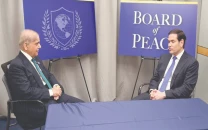An Iraqi tragedy
Brutal 30-year legacy of Saddam, inseparably wed to cruelty of American policy in the region, broke the Iraqi people.

The writer is studying for the bar at Lincoln’s Inn and tweets @AsadRahim
Not that anyone couldn’t see it coming. For the past 10 years, and the 30 years before that, Babylon’s fate was in the hands of two codependants. Saddam Hussein and America’s neocons were made for one another long before 2003, in an all-consuming embrace that ultimately left millions of Iraqis in their graves.
There was Saddam, by turns the romantic Arab moderniser the elder Bush armed, and the sadistic mustard gas fetishist the younger Bush hanged. Either image was glossed by reams of pop psychology adored by the Western press machine: the village boy, beaten bloody by his stepfather, who worshipped Stalin as an adult. The actual story got even better. An angry young bruiser among the Ba’ath Party’s limp left, Saddam was the obvious candidate to kill Iraq’s prime minister in 1959. The mission would prove disastrous. Saddam ended up with a bullet in his leg, swimming the Tigris teeth-chattering to escape.
Twenty years and several coups later, President Saddam Hussein had been baptised in fire. And so began the obsession between Saddam and the red meat-gorged Republicans that Ronald Reagan left behind. Massaged by a youthful Donald Rumsfeld, Saddam embarked on the first of several worthless wars that would become his trademark. Against Iran’s Ayatollah Khomeini, a gentleman about as subtle, dilettante generals played grand strategy in what became eight years of shockingly stupid conventional warfare. Both sides relented in 1988, bloody and bankrupt. Khomeini compared the peace with swallowing poison — Saddam declared victory and proceeded to invade Kuwait.
But the antagonism the world felt towards revolutionary Iran didn’t extend to generous Arab emirates. Having actively enabled Saddam in the past, George HW Bush and company serenely switched sides. American troops landed in Kuwait — and in Saudi Arabia, sending a lesser-known Osama bin Laden on the warpath, and Nawaz Sharif and General (retd) Mirza Aslam Beg into a well-known tussle. Saddam was thrown out but wasn’t followed back into Baghdad. As the then-US defence secretary remarked, “How many additional American casualties is Saddam worth? And the answer is, not that damned many.” Dick Cheney was speaking in 1992, before his evident change of heart. He since sacrificed 4,400 “additional American casualties” to the same cause, a number dwarfed several times over by the horrific human cost Iraqis suffered.
Fast-forward to the 2000s, and Iraq was on fire before it was ever invaded. Constant UN sanctions, pushed through by the first Bush and continued by Bill Clinton, ravaged people into helplessness. Thousands of children died from malnutrition throughout the 1990s, as both literacy rates and the Iraqi dinar fell through the floor. When Clinton’s UN Ambassador Madeline Albright was asked whether the price had been worth more children having died than had in Hiroshima, she replied, “We think it was worth it.” The sanctions were so pitiless, in fact, that the pope termed it “biological warfare against a civilian population”, a charge identical to what Saddam’s cousin had done with thousands of Kurdish civilians.
Saddam Hussein, however, grew further convinced of his godliness. He broke the Guiness world record for most presidential palaces, each brick stamped with “Victor of Allah” as the nation he led perished around him from sanctions. Uday Hussein, too, set new bars for what was expected from dissolute sons, filling a catalogue of rape, murder and professional depravity. And another dissolute son was elected to the White House in 2000.
George W Bush became president by the grace of a US Supreme Court decision. His father’s friends returned to office, this time with noticeably less human inhibitions. Invading Iraq was pegged to weapons of mass destruction. Since none existed, the Saddam regime was instead conflated with 9/11. A relationship was imagined between the pan-Arab socialists of the Ba’ath Party and the Salafi killers of al Qaeda. Even to the uninformed, the three sound worlds different. Not so for the Bush neocons; grasping the intellectual differences within “Moslem Terror” had always been a moot point.
And so, George W Bush, having long fled National Guard duty, and Dick Cheney, who had begged deferment from Vietnam a staggering five times, sent other men to kill men in Iraq. The “Victor of Allah” was discovered hiding in a rat hole; the toppling of his statue beautifully choreographed. Saddam was trussed up for trial. Meanwhile, surprising no one, Uday went out guns blazing, his suitcase stuffed with American dollars. And Iraq was left to convulse, from the inhuman degradation US troops meted out to prisoners in Abu Ghraib, to the mutual sectarian slaughter of a growing insurgency.
And all this for what? “The oil”, the liberals whispered. Halliburton was stockpiling and couldn’t save the US from recession. The Iran that the Bushes and Saddam so long despised has become critically more influential in the region. But the cast has, at least, departed forever. The Ba’ath Party is dead, its Syrian version en route. Tony Blair is spat on at book-signings. Bush is no longer president (though brother Jeb may yet surprise everyone in 2016). Dick Cheney’s heart will hopefully give out soon. The brutal 30-year legacy of Saddam, inseparably wed to the cruelty of American policy in the region, broke the Iraqi people. The war was the final blow. One may only resolve to say, never again.
Published in The Express Tribune, March 24th, 2013.



















COMMENTS
Comments are moderated and generally will be posted if they are on-topic and not abusive.
For more information, please see our Comments FAQ